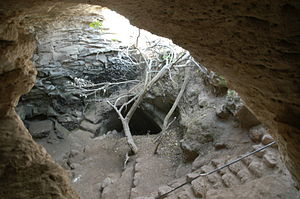Bar-Kochba revolt
| Bar Kokhba revolt | |||||||||
|---|---|---|---|---|---|---|---|---|---|
| Part of the Jewish–Roman wars | |||||||||
 Entrance into an excavated cave used by Bar Kokhba's rebels, Khirbet Midras |
|||||||||
|
|||||||||
| Belligerents | |||||||||
|
|
|
||||||||
| Commanders and leaders | |||||||||
|
|
Shimon bar Kokhba † Eleazar of Modi'im † Rabbi Akiva Yeshua ben Galgula † Yonatan ben Baiin Masbelah ben Shimon Elazar ben Khita Yehuda bar Menashe Shimon ben Matanya |
||||||||
| Units involved | |||||||||
|
Legio III Cyrenaica Legio X Fretensis Legio VI Ferrata Legio III Gallica Legio XXII Deiotariana Legio II Traiana Legio X Gemina Legio IX Hispana? Legio V Macedonica (partial) Legio XI Claudia (partial) Legio XII Fulminata (partial) Legio IV Flavia Felix (partial) |
Bar Kokhba's army
Samaritan Youth Bands |
||||||||
| Strength | |||||||||
| 2 legions - 20,000 (132-133) 5 legions - 80,000 (133-134) 6-7 legions and units from 5-6 more - 120,000 (134-135) |
200,000–400,000b Jewish militiamen
|
||||||||
| Casualties and losses | |||||||||
|
Legio XXII Deiotariana destroyeda Legio IX Hispana possibly destroyed Legio X Fretensis sustained heavy casualties |
200,000–400,000 Jewish militiamen killed | ||||||||
|
Total: 580,000 Jews killed, 50 fortified towns and 985 villages razed; "many more" Jews dead as a result of famine and disease.a Massive Roman military casualtiesa |
|||||||||
|
[a] - per Cassius Dio |
|||||||||
Decisive Roman victory:
Bar Kokhba's army
200,000–400,000b Jewish militiamen
[a] - per Cassius Dio
The Bar Kokhba revolt (Hebrew: מרד בר כוכבא; Mered Bar Kokhba) was a rebellion of the Jews of the Roman province of Judea, led by Simon bar Kokhba, against the Roman Empire. Fought circa 132–136 CE, it was the last of three major Jewish–Roman wars, so it is also known as The Third Jewish–Roman War or The Third Jewish Revolt. Some historians also refer to it as the Second Revolt of Judea, not counting the Kitos War (115–117 CE), which had only marginally been fought in Judea.
The revolt erupted as a result of ongoing religious and political tensions in Judea following on the failure of the First Revolt in 66−70 CE. These tensions were related to the establishment of a large Roman presence in Judea, changes in administrative life and the economy, together with the outbreak and suppression of Jewish revolts from Mesopotamia to Libya and Cyrenaica. The proximate reasons seem to centre around the construction of a new city, Aelia Capitolina over the ruins of Jerusalem and the erection of a temple to Jupiter on the Temple Mount. The Church Fathers and rabbinic literature emphasize governor of Judaea Rufus' role in provoking the revolt.
In 132, the revolt led by Bar Kokhba quickly spread from Modi'in across the country, cutting off the Roman garrison in Jerusalem.Roman Governor Rufus was the governor during the early phase of the uprising, attributed with the failure to subdue it. Rufus is last recorded in 132, the first year of the rebellion; whether he died or was replaced is uncertain. Initial rebel victories over the Romans established an independent state of Israel over parts of Judea for over two years, as Bar Kokhba took the title of Nasi ("prince"). Simon bar Kokhba, the commander of the revolt, was regarded by many Jews as the Messiah, who would restore their national independence. This setback, however, caused Roman Emperor Hadrian to assemble a large scale Roman force from across the Empire, which invaded Judea in 134 under the command of Roman General Sextus Julius Severus. The Roman army was made of six full legions with auxiliaries and elements from up to six additional legions, which finally managed to crush the revolt.
...
Wikipedia
